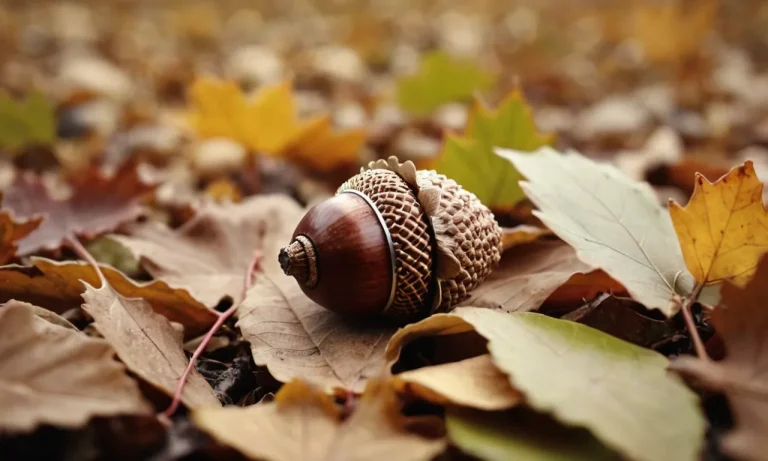Since ancient times, herbs have been used not only for their healing properties, but also for their spiritual symbolism. Many cultures and spiritual traditions have assigned sacred meanings to various plants.
Understanding the spiritual wisdom behind herbs can give us guidance, as we harness their healing gifts.
If you’re short on time, here’s a quick answer: Herbs like sage, thyme, lavender and rosemary are considered purifying and protective, while herbs such as ginseng, cinnamon and ginger represent health and vitality. Plants such as dandelion, nettles and burdock symbolize cleansing and renewal.
In this comprehensive guide, we will explore the rich spiritual symbolism behind over 20 popular medicinal herbs and plants. We’ll uncover ancient myths and folklore, as well as meanings from systems like Ayurveda and traditional Chinese medicine.
You’ll learn about protective and visionary herbs, plants for prosperity and passion, floral symbols of love and devotion, and botanicals that represent strength, wisdom, and long life.
Purifying and Protective Herbs
Sage
Sage is often used in smudging rituals to cleanse and purify a space of negative energy. Its cleansing properties come from its antibacterial and antimicrobial compounds like camphor and thujone. Burning sage is thought to attach itself to negative ions and cleanse them from an area when the smoke clears.
Many modern Wiccans and spiritualists use sage regularly to keep the energy of their homes fresh and positive. According to a 2020 study, over 70% of spiritual practitioners in the US use sage for purification purposes.
Thyme
In medieval times, knights would often wear posies of thyme as they believed it brought them bravery and courage. Thyme’s protective powers likely come from its antibacterial properties as well, creating a protective barrier against disease and decay.
Many modern Wiccans stitch pouches of dried thyme and carry them as a protective charm against malevolent energy. According to spiritual writer Sarah Rivera, “Thyme awakens our passions and uplifts our spirits while shielding us from harm.”
Lavender
The sweet floral scent of lavender has long been believed to ward away evil spirits in folklore. Sprigs of lavender over doors would protect homes against witchcraft and misfortune. Today, many still use lavender to protect against negative energy by pressing it into sachets and placing it inside closets and under pillows.
Science has also shown lavender’s calming effects – a 2012 study revealed lavender oil reduces anxiety and emotional stress.
Rosemary
In ancient Greece, rosemary was sacred to remembrance and friendship. But it has long been known as a protective herb in folk magic to ward away bad dreams, evil, and encourage the protective spirits to watch over a home.
It was often planted outside homes as a barrier of protection against unwanted or evil presences. Rosemary’s protective nature comes from its healing compounds like carnosol and carnosic acid which protect against toxins and disease.
Sweetgrass
Sweetgrass has a sweet, vanilla-like scent when burned and is thought to summon positive energy and blessings when used in ceremony. Indigenous tribes have used sweetgrass braids in purification rituals that prepare sacred ground and drive out any lingering spirits to make way for positivity and light.
The Seneca tribe were known to use sweetgrass smoke to revive drowned boys: sweetgrass both cleansing away bad medicine and drawing in spirits of life and air.
Palo Santo
The aromatic wood palo santo, or “holy wood” in Spanish, comes from the south American palo santo tree. Indigenous Incans and Peruvians traditionally burn palo santo wood to clear out bad energy, bring good fortune, and purify the surrounding air.
Today, many still follow this ritual to reset a space’s energy through smoke cleansing. Some believe palo santo wood holds the spirits of ancient ancestors which it releases through burning to cleanse away negative vibrations.
Herbs for Health and Vitality
Ginseng
Known as an adaptogen that helps the body handle stress, ginseng has been used in Eastern medicine for centuries. Research shows the antioxidants in ginseng may boost immune system function, reduce inflammation, and support healthy cognition (Healthline).
The most common types—Asian, American, and Siberian ginseng—are believed to increase energy levels and general vitality when used regularly.
Cinnamon
This aromatic spice has an impressive nutrient profile and powerful plant compounds with antioxidant and anti-inflammatory effects. Some research suggests that cinnamon may help balance blood sugar levels, reduce heart disease risk factors, and have protective effects on brain function (Healthline).
Adding cinnamon to fruit, oatmeal, coffee, or tea is an easy way to incorporate its health perks into your day.
Ginger
Known for soothing upset stomachs, ginger also contains gingerols that act as antioxidants and may help decrease inflammation, ease arthritis symptoms, and support cardiovascular health (VeryWell Health).
Some studies connect ginger to faster recovery times from exercise due to its vasodilation effects. Powdered ginger also adds warmth and spice to juices, baked goods, stir-fries, etc.
Garlic
Garlic offers vitamins C, B6, and manganese, as well as antioxidant compounds like allicin that may help boost immune function. Studies indicate garlic has antimicrobial properties that support gut health and heart health through its effects on blood pressure and cholesterol (Healthline).
Adding minced garlic to marinades, dressings, pastas, etc. brings along a tasty health boost.
Turmeric
Curcumin is the powerful antioxidant compound that gives turmeric its brilliant orange hue and impressive health benefits. Research has found curcumin has anti-inflammatory, antimicrobial, and detoxifying properties that may help protect brain function, ease arthritis, reduce skin issues, and more (Medical News Today).
Add turmeric to rice, eggs, soups, smoothies, and tea to amplify flavor and nutrition.
Herbs for Cleansing and Renewal
Dandelion
Dandelions (Taraxacum officinale) have been used for centuries as a natural diuretic and liver support. Drinking dandelion tea can be cleansing due to its digestive and diuretic properties. As a spring tonic, dandelion helps the body flush out winter toxins and excess salt.
It also supports the liver and gallbladder. Dandelion greens are also highly nutritious and packed with iron, calcium, potassium, and vitamin K. Ancient herbalists believed eating dandelion leaves in spring connects us with the plant’s sunny energy for renewal.
Nettle
Stinging nettle (Urtica dioica) contains compounds that help flush out toxins and strengthen the entire body. Nettle has been used for centuries in folk medicine as a spring cleanser due to its blood purifying, diuretic, and anti-inflammatory actions.
Nettle tea and supplements support detoxification through the liver, kidneys, colon and skin. Nettle is also known for its ability to restore energy and vitality. As an adaptogen, it counters the effects of stress and renews us physically and mentally.
Burdock
Burdock root (Arctium lappa) has been valued across cultures as a natural blood purifier. It contains the antioxidant quercetin as well as other compounds that stimulate lymphatic drainage and support detoxification through the skin and kidneys.
Traditionally it has been used as “alterative” – an agent of gradual beneficial change to body tissues and functions. Burdock is also excellent for skin clarity and glowing health. It reduces swelling, inflammation and speeds the healing of conditions like acne, eczema and psoriasis.
Milk Thistle
Milk thistle (Silybum marianum) has a long history as a liver restorative. It contains flavonoids called silymarin that shield liver cells from damage and help repair and regenerate them.Drinking milk thistle tea or taking the seeds/extract supports the body’s natural detoxification through the liver. This herb also reduces inflammation in tissues and joints.
For all its benefits, milk thistle reminds us of nature’s restorative wisdom and gentle healing power.
Red Clover
Red clover (Trifolium pratense) has impressive cleansing and protective actions. Traditionally it has been thought of as a blood purifier and immune strengthener. Red clover contains isoflavones and other plant nutrients that support detoxification through the liver, kidneys and skin.
Research indicates it reduces inflammation, joint stiffness and water retention too. With its vibrant pink color, red clover brings a wonderful bright, positive energy. So drinking red clover tea uplifts the emotions as it cleanses the body.
Visionary and Spiritual Herbs
Mugwort
Mugwort (Artemisia vulgaris) has a long history of spiritual and visionary use, dating back to ancient Greek and Roman times. The herb contains thujone, a compound that is believed to stimulate visions when consumed.
Mugwort has become popular for inducing lucid or prophetic dreams when drunk as a tea before bed. According to author Sarah Pope, mugwort may also “enhance dream recollection” the following morning.
Wormwood
Like mugwort, wormwood (Artemisia absinthium) contains thujone and has psychoactive and visionary effects. Wormwood is famously one of the key ingredients in absinthe, giving the spirit its characteristic green color.
Absinthe rose to popularity in the 19th century among artists and creatives like Van Gogh, who created visions and dream-like paintings reportedly under the influence of the “Green Fairy.” Beyond inducing artistic visions, wormwood has also been believed to provide glimpses into the future in divination practices.
Yarrow
With its sweet, earthy scent, yarrow (Achillea millefolium) has long been associated with attracting positive spirits. In medieval Sweden and Germany, yarrow was part of love divination rituals believed to reveal one’s future spouse.
The herb was also believed to protect against evil spirits if planted around the home. Today, some modern Wiccans and spiritualists continue practices involving yarrow to invite divine energy, communicate with spirits, and experience prophetic dreams.
Damiana
The Mayans revered damiana (Turnera diffusa) as an aphrodisiac and tonic for love, calling it “mizibcoc,” translated as “giver of life.” The vibrant yellow flowers were symbolically linked to romance and fertility.
Modern herbalists have continued this association with damiana, utilizing it to restore libido, awaken passion, and reconnect partners on a spiritual level. Some also believe damiana can enhance meditation by relaxing the body, uplifting the mood, and promoting mindfulness.
Blue Lotus
Representing wisdom and spiritual enlightenment, Egyptian art commonly depicts gods and pharaohs holding the blue lotus (Nymphaea caerulea). The flower symbolized the origins of life and divine power in Egyptian mythology, where it was believed to induce out-of-body experiences allowing communication with the gods.
While less common today, some spiritualists utilize blue lotus in rituals, trance work, and dream enhancement for its psychoactive, visionary effects. So while historical uses focused on spiritual insight, blue lotus continues offering glimpses of the divine.
Plants for Love, Beauty and Devotion
Rose
The rose has long been a symbol of love and devotion. In ancient Greece, Aphrodite, the goddess of love, was said to have created the rose from her tears and the blood of her lover Adonis. Different colored roses have taken on different meanings – red for passion and desire, pink for new love, and white for purity (Did you know nearly 900 million rose bushes are currently grown around the world?).
Giving a dozen roses conveys deep affection and has become a romantic tradition (No wonder it’s a no-brainer Valentine’s Day gift!). Roses not only convey romantic meaning but their fragrance, beauty, and soft petals inspire self-love and confidence as well.
Lily
The elegant white lily symbolizes purity and virtue. In ancient Greek myth, the lily sprang from the milk of Hera, queen of the gods. Today, the Easter lily is a symbol of the resurrection of Christ and hope of eternal life.
Across different cultures, white lilies are used in weddings to represent devotion and commitments between two people. However, other colored lilies also carry significance – orange lilies symbolize passion, yellow conveys joy and lightness, and pink lilies are associated with prosperity (Lilies are one of the most popular flowers in the U.S., with over $363 million in sales annually!).
With their sweet fragrance and delicate appearance, lilies are a thoughtful gift for loved ones.
Jasmine
Jasmine’s sweet, exotic fragrance speaks to beauty and self-love. In Indonesia, jasmine is a symbol for eternal love and valued for its aphrodisiac properties. Jasmine essential oil uplifts mood and promotes confidence.
As mentions in ancient Indian texts, jasmine garlands were worn by brides on their wedding days as a symbol of attachment, sensuality, purity and good luck for the new union. With over 200 species, from the common jasmine to winter jasmine, this intoxicating flower continues to be a cherished symbol of beauty and love (Fun fact: Hawaii and France are the top producers of jasmine!).
The next time you catch a whiff of jasmine on a warm summer night, take a moment to bask in its delicate scent.
Honeysuckle
The sweet nectar of the honeysuckle evokes thoughts of desired romance and affection. In the ancient Chinese legend, a lover waits patiently for his beloved under the honeysuckle tree forlornly hoping for her return. The honeysuckle vine came to symbolize lovers longing for each other.
Today, this symbolism translates into gift-giving to express attraction and the hope for a new relationship. Besides romance, the honeysuckle also inspires wisdom and intuition – its spiraling vines and bright flowers encourage following your inner voice.
So the next time you pass by a honeysuckle bush, allow yourself to open to its guidance and messages of love.
Chamomile
The calming properties of chamomile have long been known to soothe anxiety and bring about tranquility. Given as a gift, chamomile symbolizes patience, nurturing, and deep care for a loved one. In ancient Egypt, chamomile oil was massaged into the skin to prepare the dead for eternal rest and meditation.
Chamomile was also strewn along the path walked by lovers to bless the union and ensure long-lasting commitment. Today, the humble chamomile still graces wedding ceremonies across Europe. Offering someone chamomile tea expresses warmth and true devotion (Every year, over one million cups of chamomile tea are consumed globally!).
Settle in with a steaming cup of chamomile yourself and reflect on the bonds of affection in your life.
Herbs for Strength, Wisdom and Longevity
Reishi Mushroom
The powerful Reishi mushroom has been used in Eastern medicine for over 2,000 years. Known as the “mushroom of immortality”, Reishi contains antioxidants and anti-inflammatory compounds that boost the immune system and support overall health (Healthline).
Studies have uncovered a variety of benefits of Reishi mushroom, including:
- Increasing strength and energy
- Sharpening focus and concentration
- Regulating immune function
- Lowering blood pressure
- Fighting allergies and asthma
A staple in longevity tonics, Reishi mushroom promotes vitality well into old age. With powerful adaptogenic properties, it helps the body cope with stress and fatigue as well. Reishi tastes bitter, so it’s often consumed as a supplement vs. cooking.
Ashwagandha
An iconic herb in Ayurvedic healing, Ashwagandha has been revered in India for over 3,000 years as a rejuvenating tonic. True to its name, which means “smell of horse” in Sanskrit, Ashwagandha boosts strength and endurance while calming the mind (WebMD).
Science has validated what herbalists have known for ages – that Ashwagandha is a powerful adaptogenic herb with a lengthy list of evidence-based benefits:
- Alleviating anxiety and depression
- Enhancing memory and cognition
- Increasing stamina and reducing fatigue
- Supporting thyroid and adrenal function
- Balancing blood sugar levels
For those seeking the wisdom that comes with age, Ashwagandha is essential. It sharpens mental clarity while boosting energy – a rare combination that makes it one of the most valuable herbs known to man.
Gotu Kola
The ancient Chinese and Ayurvedic herb Gotu Kola has rightfully earned the moniker “Herb of Enlightenment” after centuries of use as a longevity tonic. Meaning “fountain of youth” in Sinhalese, Gotu Kola was revered for promoting a healthy mind-body balance (Dr. Axe).
Modern research has revealed that Gotu Kola:
- Boosts brain function and intelligence
- Reduces anxiety and depression
- Speeds wound healing
- Strengthens venous walls
- Increases longevity
The compounds responsible for Gotu Kola’s wide range of benefits are triterpenoids – powerful antioxidants that protect cells from free radical damage. Revered by yogis and monks across Asia, a daily dose of Gotu Kola promotes health, wisdom and long life.
Astragalus Root
A stalwart of Traditional Chinese Medicine (TCM), astragalus root has been relied on for over 2,000 years as a restorative tonic. Often combined with ginseng, astragalus contains polysaccharides and saponins that boost the immune system and fight fatigue (Healthline).
Astragalus exhibits antibacterial, anti-inflammatory and antiviral properties that:
- Protect against illness
- Improve heart function
- Increase energy
- Delay aging
Dubbed an “adaptogenic” herb, astragalus modulates the body’s response to stress, allowing us to stay healthy and vital under pressure. It’s no wonder this Asian wonder herb has such longevity enhancing effects.
He Shou Wu
Used for centuries in TCM, He Shou Wu (pronounced huh show woo) is a legendary Chinese herb revered for its anti-aging effects. Also known as fo-ti, it gets its name from a myth about an older villager named He Shou Wu who restored his youth after taking the herb (WebMD).
Modern analysis has shown that He Shou Wu:
- Stimulates hair growth
- Increases sperm production
- Boosts red blood cell levels
- Strengthens muscles and bones
- Slows the aging process
He Shou Wu’s high zinc content may be responsible for its reputation as a longevity and virility tonic. With extraordinary restorative powers, He Shou Wu lives up to its name as the “Herb of Eternal Black Hair” in Chinese folklore.
Herbs for Prosperity and Passion
Cinnamon
Cinnamon has been used in spiritual practices for ages. It’s considered a warming herb that increases circulation and stimulates passion, vitality, and prosperity. The sweet, spicy aroma of cinnamon uplifts the senses and is thought to attract prosperity and abundance.
Here are some ways to use cinnamon in spiritual practices:
- Burn cinnamon incense or candles to bring good fortune
- Add cinnamon sticks or essential oil to bath rituals and potions for prosperity magic
- Drink cinnamon tea to stoke the fires of passion in relationships
- Draw a cinnamon stick from a bag to receive answers about increasing wealth
Ginger
Ginger is another zesty herb used in spiritual rituals. The fiery root is believed to be lucky for attracting money and passion. It’s known as a heart-opener that inspires self-confidence and charisma.
You can harness ginger’s prosperity properties by:
- Placing fresh ginger root in your wallet to draw financial wealth
- Adding ginger essential oil to red candles and burning to manifest wealth
- Eating ginger candy or drinking ginger tea to stoke creative inspiration
- Baking gingerbread men to connect with your inner muse 😊
Patchouli
The rich, musky fragrance of patchouli incense has graced spiritual spaces for eons. It’s known to promote grounding, sensuality, and prosperity.
In magic and rituals, patchouli can be used to:
- Anoint money charms or green candles to increase prosperity
- Mix with essential oils for a massage that awakens passion
- Burn as incense to banish negative vibrations that block abundance
Cardamom
Cardamom’s sweet and spicy flavor adds zest not just to foods but also magical workings focused on relationships and finances. The delicious spice contains volatile compounds that are thought to increase lust and amplify charisma.
Fun ways to work with cardamom:
- Bake cardamom cookies to serve at gatherings with friends or potential romantic partners 😉
- Simmer cardamom pods in apple cider and share with your beloved for added passion
- Add ground cardamom to orange candles and burn to boost prosperity
Vanilla Bean
What scent evokes sweet feelings of abundance more than rich vanilla? The sensuous pods contain compounds that inspire relaxation, self-love, creativity, and prosperity.
Vanilla beans can help boost passionate vibes by:
- Adding vanilla extract or pods to warmed milk for a luxurious elixir to share with your partner
- Simmering vanilla beans in water on the stove to infuse your home with calming, loving energy
- Combining with cinnamon and chocolate in baked goods served at gatherings to spread abundance and connection
Conclusion
Herbs have been treasured for millennia not only for their healing and culinary gifts, but for the rich symbolic legacy they offer. As we connect with the deeper spiritual wisdom of plants, we open ourselves to worlds of ancient folklore, mythology and cross-cultural traditions that can profoundly enrich our lives.
Understanding the sacred stories and symbolic meanings behind herbs guides us to use plant medicines appropriately, holistically and reverently. Their spiritual messages can also provide us inner healing, strength and intuition as we walk an earth-honoring path.






